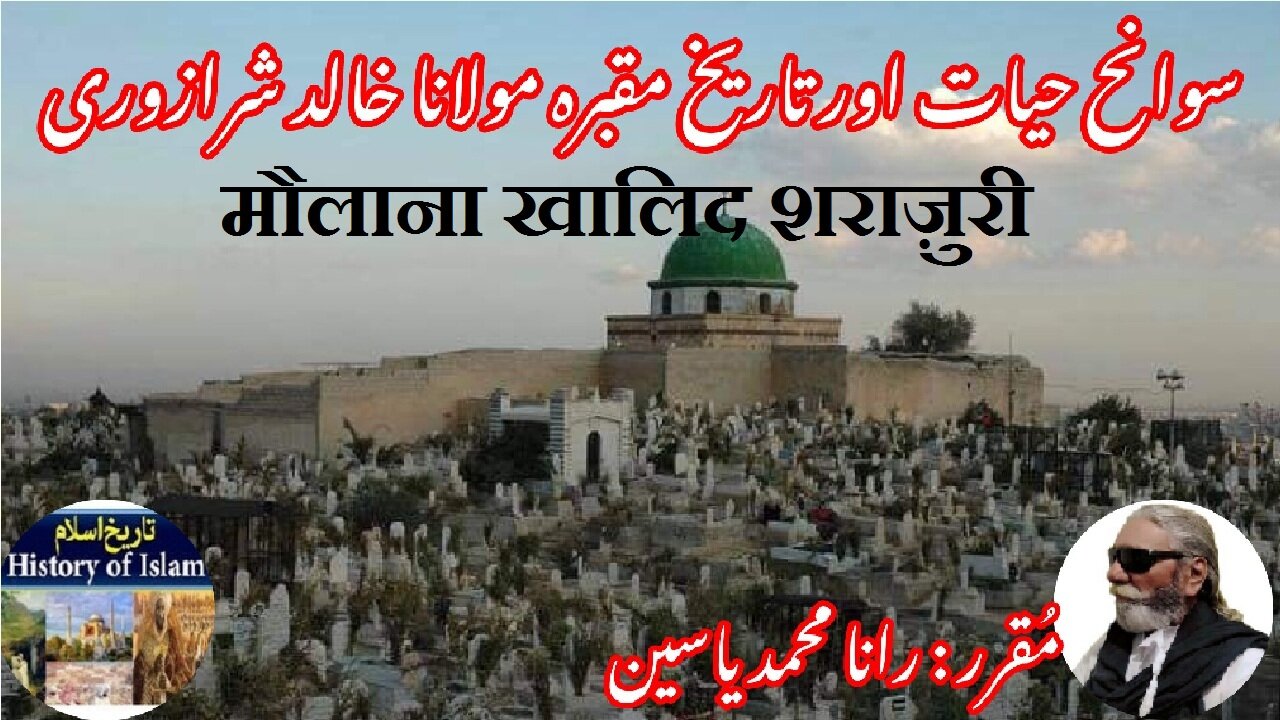Premium Only Content

Mawlana Khalid Sharazuri मौलाना खालिद शराज़ुरी مولانا خالد شرازوری کی سیرت اور ان کے مزار کی تاریخ
@islamichistory813 #mawlanakhalidsharazuri #sufisaint #culturalheritage #biography #islamicmysticism #islamicphilosophy #shrine #historicalfigures
Biography of Mawlana Khalid Sharazuri and the history of his shrine
Dekhti Aankhooon aur sountay kaanoon ko Asslamoalaikum, sisters, brothers friends and elders, in informative series videos of Islamic ascolars, sufisaints, cultural heritages, islamic philosophys, islamic mysticisms and historical figures. today we are describing biography of Mawlana Khalid Sharazuri and the history of his shrine.
Mawlana Khalid Sharazuri also known as Khalid-i Baghdadi and Mawlana Khalid was a Kurdish Sufi, and poet by the name of Shaykh Diya al-Din Khalid al-Shahrazuri, the founder of a branch of the Naqshbandi Sufi order - called Khalidi after him - that has had a profound impact not only on his native Kurdish lands but also on many other regions of the western Islamic world. His writings are among the earliest examples of prose and poetry in Central Kurdish.
Shahrazuri acquired the epithet Baghdadi through his frequent stays in Baghdad, for it was in the town of Karadag (Qaradagh) in the Shahrizur region, about 5 miles from Sulaymaniyah, that he was born in 1779.
He was born in the year 1779 in the village of Karadag, near the city of Sulaymaniyah, in what is now Iraqi Kurdistan. His family belonged to the Jaff tribe that claimed descent from the 3rd caliph 'Uthman. Hence, the attribution al-'Uthmani is sometimes added to his name. He was raised and trained in Sulaymaniyah, where there were many schools and many mosques and which was considered the primary educational city of his time. Young Khalid studied with the two great scholars of his time, Shaykh Abdul Karam al-Barzinji and Shaykh Abdur Rahim al-Barzinji, and he read with Mullah Muhammad `Ali
Mawlana Khalid Baghdadi (may Allah have mercy on him) was the renewer of his age, and was an ocean of both inner and outer knowledge. His lineage goes back to Uthman ibn Affan (may Allah be pleased with him) on his father’s side, and Ali (may Allah be pleased with them him) on his mother’s side. His title was Ziyauddin and he was known as Uthmani.
Mawlana Khalid Baghdadi was born in the town of Zur in the north of Baghdad. Even from a very young age he possessed a sharp intelligence, strong memory, strong will and was extremely hard working so that he reached a very high station in both the rational and traditional sciences of that time. He specialised in practically all fields including mathematics, engineering and astronomy. Whenever he was asked a question about any of the sciences he would reply immediately, and leave everyone in awe of his superior intelligence and deep knowledge. He learned from many of the great scholars of the time and took his licence from them. He thus became the highest of the scholars and masters of tasawwuf of that period. Mawlana Khalid Baghdadi lived a life of abstention and taqwa and became aware of the mysteries of the Holy Qur’an. He was the scholar of scholars. He was known as the ‘Shamsu as Shumus’ that is, the sun of suns. He had knowledge of the mysteries of reality and of the reality of mysteries.
Even before he received his ijaza and while he was still a student, he became distinguished in his knowledge and drew the attention of all around him. One time when Abdurrahman Pasha, the administrator of Suleymaniye visited him, he was amazed by his knowledge and wisdom and made him the following offer:
“Take your pick of any of the madrasahs of Suleymaniye and you may be its teacher”.
However Khalid Baghdadi did not accept this offer due to his elevated zuhd and taqwa. Since he had not yet received his ijaza, he said out of respect for the traditions of scholarship:
“I am not competent for this service…”.
A little while later his teacher died of tuberculosis and he was forced to take his teacher’s position. Many famous scholars from various lands came to him and benefitted from him by having their various difficulties solved. However, since Mawlana Khalid desired to turn to Allah with supererogatory prayer, in addition, to the obligatory duties, he would not sit with the judges, governors or rulers and would behave independently towards everyone.
Mawlana Khalid’s words had a great impact on all people, be they common or knowledgeable. He lived an upright life that was admired by even the greatest of scholars. He was a true Friend of Allah, loved by all, very patient and content. He was an extremely honourable man, teary-eyed, his heart full of divine attraction, and the traces of his deep contemplation could be seen on his face.
After teaching for seven years, Khalid Baghdadi set out for the Hijaz in the year 1805, motivated by his deep love for the prophet (peace and blessings be upon him). He was shown great respect on the way by the scholars of Syria. During this time he received a Qadiri ijaza from a man called Mustafa Kurdi. However he still believed that he had to advance more in the path of perfection, displaying great modesty and humility. This is why when he reached Madina, his desire was to find a perfect wali and submit to him in order to advance spiritually.
Hence, that great ocean of knowledge reached Madina in this state of mind. One day he encountered a man whose face was filled with light. He was immediately attracted to this Friend of Allah, who was from the Yemen and asked him for counsel, just as an ignorant man would ask for advice from a scholar. That man said to him:
“O Khalid! When you reach Mecca, if you happen to see something contrary to adab, do not immediately think bad of the one you see, and thus come to the wrong conclusion. Keep your eye and your heart away from finding faults and blame. Keep busy with your own inner world”.
At first what looked like a concealed caution turned out in reality to be an indication of the mysterious appearance of the Perfect Guide Abdullah Dahlawi, who would allow Mawlana Baghdadi (may Allah have mercy on them both) to reach his true station.
However, when he arrived in Mecca, Khalid Baghdadi was overcome by spiritual excitement and his heart was almost intoxicated so that on one Friday, he saw a strange-looking dervish with a radiant face and dishevelled clothes. He was struck by this dervish who had turned his back to the Ka’bah and was looking at him. He said to himself:
“This man is not showing the required respect towards the Great Ka’bah. He is sitting with his back turned to the Ka’bah.
After his pilgrimage and visit to the Holy Prophet salla, he went back to Sham ash-Sharif (Blessed Syria). He was so well-respected by the Ottoman Sultan, Mahmud Khan, that when he entered Sham a huge celebration was held and 250,000 people welcomed him at the gate of the city. All the scholars, ministers, and Shaykhs, the poor and the rich came to take his baraka (blessing) and to ask for his prayers. It was a celebrated day. The poets sang its praises and the rich fed the poor. Everyone was equal before him when he entered the city. He revived the Spiritual knowledge and the external knowledge and spread that light for which people, both Arabs and non-Arabs, came and accepted the Naqshbandi Order at his hand.
In the last ten days of Ramadan of the year 1242 H./1827 AD. he decided to visit Quds (Jerusalem) from Damascus. His followers were very happy and he said, “Alhamdulillah, we will do it if Allah gives us life, after Ramadan, in the beginning of Shawwal.” That was an indication that he might be leaving this world. In the first days of Shawwal, the plague began to spread quickly in the city of Sham (Damascus). One of his followers asked him to pray for him to be saved from the plague, and added, “And for you also my Shaykh.” He said, “I feel shy before my Lord, because my intention in coming to Sham was to die in this Holy Land.”
The first one to die from the plague was his son, Bahauddin, on the night of Friday and he said, “Alhamdulillah, this is our way,” and he buried him on the Mount of Qasiyun. He was five years and some days old. That child was fluent in three languages, Persian, Arabic, and Kurdish, and he used to read Qur’an. Then, on the 9th of Dhul-Qi`da, another son, Abdur Rahman, passed on. He was older than his brother by one year.
Mawlana Khalid (q) ordered his murids to re-open the grave to bury his second son. He said, “From my followers so many are going to die.” He ordered them to dig many graves for the many followers, including his wife and his daughter, and he ordered them to water the area. Then he said, “I am giving the authority to succeed me in the Naqshbandi Tariqat to Shaykh Isma`il ash-Shirwani.” He said this the year of his death, 1242 H./1827 AD.
One day he said, “I had a great vision yesterday: I saw Sayyidina `Uthman Dhun-Nurayn radiya as if he were dead and I was praying over him. He opened his eyes and said, ‘This one is from my children.’ He took me by the hand, brought me to the Prophet salla, and told me to bring all the Naqshbandi followers of my time and after my time up to the time of the Mahdi salla, and he blessed them. Then I came out of that vision, and I prayed Maghrib with my followers and my children. “Whatever I have of secrets I have given to my deputy Isma`il ash-Shirwani. Whoever does not accept him is not from me. Don’t argue but be of one mind and follow the opinion of Shaykh Isma`il. I guarantee that anyone of you who accepts and follows him will be with me and with the Prophet salla.”
He ordered them not to cry on his behalf, and he asked them to slaughter animals and feed the poor for the love of Allah and the honor of the Shaykh. He asked them to send him gifts of reading from Qur’an and recitations of prayers. He ordered them not to write anything on his grave except, “This is the grave of the stranger Khalid.
With this, we seek your permission until tomorrow, tomorrow we will describe the biography of Qutb al-Din Bakhtiyar Kaki and the history of his Shrine. Allah Hafiz.
=================
-
 28:40
28:40
SLS - Street League Skateboarding
8 days agoTOP MOMENTS IN WOMEN’S SLS HISTORY! ALL THE 9’s - Rayssa Leal, Leticia Bufoni, Chloe Covell & more…
8.18K -
 23:00
23:00
Exploring With Nug
13 hours ago $10.27 earnedHis Truck Was Found Crashed in the Woods… But He’s Gone!
59K5 -
 27:09
27:09
MYLUNCHBREAK CHANNEL PAGE
14 hours agoDilmun: Where Life Never Ends
55.8K37 -
 DVR
DVR
Slightly Offensive
7 hours ago $43.08 earnedHas Trump FAILED US? The ABSOLUTE STATE of The Right Wing | Guest: Nick Fuentes
66.9K34 -
 1:37:05
1:37:05
AlaskanBallistics
3 hours ago $0.67 earnedI Love This Gun PodCast #16
6.89K3 -
 2:59:26
2:59:26
Twins Pod
11 hours agoEMERGENCY PODCAST WITH ANDREW TATE! - Twins Pod - Special Episode - Andrew Tate
139K134 -
 2:52:01
2:52:01
Jewels Jones Live ®
2 days agoTRUMP SECURES BORDER | A Political Rendezvous - Ep. 113
68.8K30 -
 25:02
25:02
marcushouse
1 day ago $40.62 earnedStarship Just Exploded 💥 What Went Wrong This Time?!
149K70 -
 12:00
12:00
Silver Dragons
1 day agoBullion Dealer Reveals Best Silver to Buy With $1,000
91.9K9 -
 12:58
12:58
NinjaGamblers
15 hours ago $2.21 earnedIs This The BEST Way to Win At Roulette? 😲
135K13